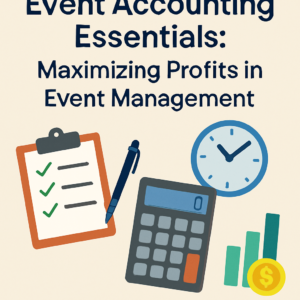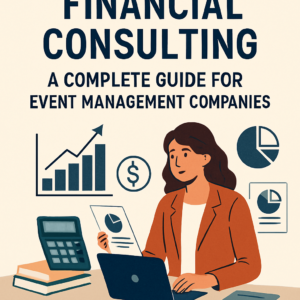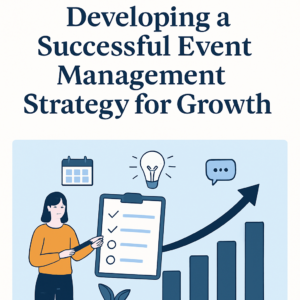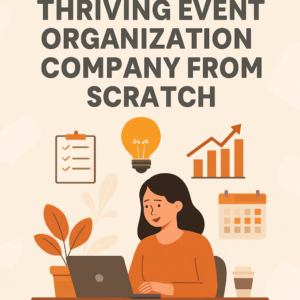Creating an Event Business Plan That Actually Works
Planning a successful corporate event requires more than just creativity and logistical skills; it demands a solid business plan. Whether you’re launching a startup event management company or seeking to refine your strategy, this guide will walk you through creating an event business plan that truly works. Let’s dive into the essential components that can help your business thrive in the competitive world of corporate events.
Understanding the Purpose of Your Event Business Plan
Picture this: You’re jet-setting through the whirlwind of corporate event management, juggling a zillion details faster than a circus performer on caffeine. But here’s the kicker—without an event business plan, you’re essentially flying blind. It’s like trying to host a gala dinner without knowing if you’re serving steak or tofu. In short, it doesn’t end well for anyone.
An event business plan is your roadmap, your North Star. It’s more than just a document; it’s your strategic partner that helps you navigate through the hustle and bustle of corporate event coordination.
Why You Need One:
- Clarifies Objectives: Whether you’re planning a glitzy product launch or an intimate board retreat, knowing the “why” behind your event is crucial. Your plan should detail these goals with the precision of a Swiss watch.
- Guides Financial Planning: An effective plan dives deep into financial best practices for event coordination companies. It’s not about having deep pockets but wise spending. And yes, penny-pinching isn’t always glamorous, but it’s necessary! Check out our master guide to budgeting and forecasting for pro tips.
- Enhances Communication: Imagine trying to communicate the essence of your event without a clear outline—like playing charades with important stakeholders. Spoiler alert: Nobody wins.
- Improves Risk Management: A comprehensive plan anticipates potential risks and offers strategies to minimize them quicker than you can say “rainy-day backup venue.”
The purpose of your event business plan is not to be an obstacle but an ally in crafting memorable experiences for attendees. Remember what Michelle B says, “Events are not just about the event itself, but about the experience you create for your attendees.” (source)
If you’re new to this, think of it as building personal relationships—not every part fits perfectly at first, but with time and patience, you’ll create something meaningful that aligns with personal and business goals alike.
No matter what type of occasion you’re orchestrating—a conference planning guide or a festival coordination plan—a solid business strategy is key to turning chaos into clarity. And let’s be real, who wouldn’t want that?
Key Elements of a Successful Event Planning Strategy
Hey there, fellow event maestros! Let’s dive into the magical world of crafting an event business plan that doesn’t just gather dust on a shelf. Think of it as the secret sauce to your event planning success—a blend of creativity, strategy, and a bit of fun thrown in for good measure. So, what exactly goes into a successful event planning strategy? Grab your favorite drink and let’s break it down.
1. Define Your Objectives
First things first: why are we throwing this shindig? Understanding the core purpose of your event is critical. Are you aiming to dazzle potential clients at a corporate gala or raise funds for a charity close to your heart? Knowing your objectives will guide every decision you make—from venue selection to the choice of hors d’oeuvres (because no one wants to attend another boring cheese platter affair).
2. Know Your Audience
Your audience is the heart and soul of any event. Get to know them like you would your best friend’s quirks (yes, even their inexplicable obsession with themed socks). Are they looking for an interactive experience or something more laid-back? Tailoring your approach based on audience preferences can transform an event from mundane to memorable.
3. Develop a Detailed Event Project Plan
A solid event project plan acts as your roadmap—complete with pit stops and scenic views. Break down tasks into manageable chunks with timelines and responsibilities clearly assigned. Use tools like Trello or Asana for task management, because who doesn’t love ticking off checkboxes?
4. Craft a Realistic Budget
The word “budget” might cause some eye-rolling, but trust us—it’s essential! A well-planned budget not only keeps you on track financially but also assists in making strategic decisions that align with your event goals. Check out our master guide to budgeting and forecasting for event management firms, because running out of funds halfway through is nobody’s idea of fun.
- Sponsorship Plan: Partnering with sponsors can provide financial relief while adding value through brand association.
- Contingency Fund: Set aside at least 10% for unexpected expenses—because who could’ve predicted last year that those inflatable flamingos would be such a hit?
- Venue Costs: Don’t just consider rental fees; factor in logistics like transport and accommodation if necessary.
5. Execute with Precision & Flexibility
No plan survives first contact with reality without needing tweaks—think of it like an epic dance-off between precision and adaptability. Ensure that everything runs smoothly by having contingency plans in place but remain flexible enough to adjust as needed when surprises pop up (and they will!).
6. Evaluate and Reflect Post-Event
The curtain has fallen, but the show isn’t over yet! Take time afterward for evaluation sessions where you review what worked well—and what didn’t quite hit the mark—to refine future strategies.
Nailing these key elements will arm you with an strategic event planning framework, empowering you to create unforgettable experiences time after time!
Crafting Your Corporate Event Blueprint
Okay, let’s be real—creating a corporate event blueprint isn’t just about jotting down a few ideas on a napkin while sipping that third cup of coffee (although we’ve all been there). It’s about building a strategic event management plan that not only knocks the socks off your clients but also stands the test of time. So, how do you go from vision to execution seamlessly?
1. Define Clear Objectives
Diving headfirst into event planning without clear objectives is like trying to bake a cake without a recipe—messy and likely to end in disaster. Start by asking yourself: What are the main goals of this event? Is it to educate, celebrate, sell, or all of the above? Setting concrete objectives will not only streamline your planning process but make measuring success so much easier. Plus, if things go awry, you’ll have something more substantial than “Oops” to fall back on.
2. Know Your Audience Inside and Out
Understanding your audience is key—after all, nobody wants to throw a disco-themed gala for a group that prefers jazz (unless mismatched themes are your thing). Conduct surveys or utilize analytics tools to gather insights on your attendees’ preferences and expectations. Tailoring the corporate event blueprint based on these insights can significantly enhance attendee experience.
3. Budget Like a Boss
If you’re thinking budget planning is as fun as watching paint dry—you might be right. But it’s crucial! Allocate resources wisely by breaking down costs into categories such as venue, catering, marketing, and entertainment. Use tools or consult financial experts for budgeting and forecasting. Remember, an organized budget means fewer surprises down the road!
4. Create an Engaging Marketing Plan
- Email Campaigns: Personalized emails can capture attention effectively.
- Social Media: Leverage platforms like LinkedIn and Instagram for promotional blasts.
- Content Creation: Blog posts or video teasers can build anticipation.
The goal is engagement—not just attendance numbers! An average of 30% more people attend events that they heard about from social media sources, so put those likes and shares to work! (Event Manager Blog)
5. The Devil’s in the Details: Venue & Logistics
Nailing down logistics is where your event blueprint transforms from paper into reality. Consider factors like accessibility, capacity, aesthetics—all important details that could make or break your day-of operations. Looking for tips? Check out our comprehensive guide on financial best practices for event coordination companies.
The Bottom Line: Your Blueprint = Your Success Map
Your corporate event blueprint isn’t just another document—it’s your roadmap to success and sanity (or whatever’s left of it). By following these steps with precision and flair, you ensure not only a well-organized event but one that’s memorable for all the right reasons.
If you’re ready to take your strategy even further—or just need someone other than yourself to blame when things get chaotic—consider investing in professional services that cater specifically to corporate events.
Developing an Effective Financial Strategy
Let’s face it, crunching numbers might not be the most glamorous part of planning a corporate event, but it’s undoubtedly one of the most crucial. Without a solid financial strategy, even the most meticulously planned event can wobble and fall like a poorly built Jenga tower at a team-building retreat. But fear not! We’re here to help you build a robust financial framework that keeps your event business plan on solid ground.
1. Know Your Numbers
Before jumping into the more exciting aspects like selecting floral arrangements or hiring that avant-garde mime artist, you need to understand your costs and revenue streams inside out. Analyze historical data from past events to forecast potential expenses and income accurately. Remember, every dollar counts—whether it’s for venue rental or the last-minute espresso runs for those late-night brainstorming sessions.
2. Budget Like A Pro
A well-structured budget serves as the backbone of your event business plan. Break down your budget into categories such as venue costs, marketing, staffing, and hospitality. Utilize tools like Excel or specialized budgeting software to track every penny and stay within your financial limits. Who said spreadsheets can’t be fun? Try color-coding them; it’s practically adult coloring with numbers!
3. Plan for Contingencies
No matter how bulletproof your plan seems, unexpected expenses will pop up faster than an uninvited plus-one at a wedding reception. Set aside a contingency fund—roughly 10% of your total budget—to tackle unforeseen costs without pulling your hair out.
- Pro Tip: A little foresight goes a long way! Check out our Financial Best Practices for Event Coordination Companies.
4. Revenue Streams: Not Just Ticket Sales!
Diversify where possible! Beyond ticket sales, consider sponsorships, merchandise sales, or even hosting workshops within your event to create additional revenue streams. In 2020, sponsorship spending on events in North America reached billion (Statista), so don’t leave that money on the table.
5. Monitor & Adjust
Your financial strategy should be as dynamic as your event itself—continuously monitor finances in real-time and make adjustments accordingly. This approach not only ensures you’re meeting financial benchmarks but also provides insights for future event planning strategies.
Your corporate event blueprint deserves nothing less than meticulous attention to its financial underpinnings because when you take control of the numbers, everything else falls into place more smoothly—like finding that elusive perfect caterer who can make gluten-free taste good!
Nailing Down Your Event Marketing Plan
Alright, let’s roll up those sleeves and dive into the riveting world of event marketing plans. If you just pictured a sea of spreadsheets and endless to-do lists, don’t worry—you’re not alone. But trust me, with a pinch of strategy and a dash of creativity, your event marketing plan can go from drab to fab!
Know Your Audience Like You Know Your Best Friend
The first step in creating an effective event marketing plan is understanding your audience. No, I don’t mean stalking them online (let’s keep it ethical, folks). Instead, spend time researching who they are, what they like, and where they hang out online. According to a Forbes study, knowing your audience can boost engagement by up to 24%—now that’s something worth texting home about!
Set Clear Objectives
Before you start writing catchy taglines or designing snazzy graphics, settle on what you want to achieve. Are you aiming for more attendees than last year? Looking to increase sponsor engagement? Whatever your goals are, write them down. This clarity will guide every other decision in your event marketing journey.
Leverage the Power of Social Media
- Hashtags Are Your Friends: Craft a unique hashtag for your event that can help create buzz and make it easy for attendees to engage.
- Choose the Right Platforms: Whether it’s Instagram for visual storytelling or LinkedIn for corporate networking—choose platforms where your audience lives.
- Engage and Interact: Social media isn’t just about broadcasting; it’s about building community. Respond to comments and encourage discussions.
Create Riveting Content
Your content should be as irresistible as that last donut in the office kitchen. Create teaser videos, behind-the-scenes clips, interviews with speakers—anything that adds value and piques interest. A well-crafted content strategy can be the wind beneath your promotional wings! For more on creating impactful events, check out this insightful guide on our site: Creating High-Impact Executive Events: A Financial Blueprint.
The Importance of Analytics
No marketing plan is complete without measuring its success. Use tools like Google Analytics or social media insights to track what’s working and what’s not. According to HubSpot’s latest report, companies using analytics are twice as likely to see a significant return from their marketing efforts (source). So go ahead, embrace those numbers—they’re there to help!
Nailing down an exceptional event marketing plan is an art form; one that requires a blend of strategic thinking and creative flair. But with these tips in hand, you’re well on your way to turning heads and attracting attention at every corner.
The Importance of a Detailed Event Project Plan
Ever found yourself in the middle of planning a corporate event, feeling like you’re juggling flaming swords while riding a unicycle? You’re not alone! That’s where a meticulously crafted event project plan swoops in like your personal superhero. But why exactly is this blueprint so crucial?
Organization Equals Success
A detailed event project plan is your roadmap to success. Without it, you might as well be driving blindfolded in the middle of rush hour. This plan outlines every aspect of your event, from initial concept to the final wrap-up. Imagine it as Google Maps for your corporate events, ensuring you know every pit stop and potential detour.
- Clarity and Focus: A comprehensive plan provides clarity on roles and responsibilities. Everyone knows who’s doing what, eliminating those awkward “I thought you were handling that” moments.
- Resource Management: By detailing every resource needed—be it time, money, or manpower—you ensure nothing slips through the cracks. This is your chance to avoid those “Oops, we forgot the sound system” disasters.
- Risk Mitigation: With everything laid out neatly, you’re primed to spot potential issues before they become full-blown catastrophes.
The Backbone of Financial Planning
Your [event budget planning](https://kommaswithkelle.com/master-guide-to-budgeting-and-forecasting-for-event-management-firms/) hinges on this detailed document. It helps you strategize expenses without crossing into panic attack territory when unexpected costs arise. After all, no one wants to have a heart-to-heart with their accountant about surprise charges.
A Real-World Example
Take the annual tech conference hosted by a Silicon Valley giant (we won’t name names). Their event project plan reads like an encyclopedia—every session timed to perfection and every speaker prepped like they’re auditioning for TED Talks. The result? A seamless event that’s talked about for months. Who wouldn’t want that kind of buzz?
A Living Document
An effective event project plan isn’t a “set it and forget it” scenario; it’s a living document that evolves as your event does. This flexibility allows you to adapt quickly to changes—because let’s face it, even the best-laid plans can encounter hiccups (or unexpected blizzards).
If you’re ready to dive deeper into financial best practices for your events, don’t miss our guide on [financial best practices for event coordination companies](https://kommaswithkelle.com/financial-best-practices-for-event-coordination-companies/).
“For every dollar spent on events, companies see between – in return value.” — Event Manager Blog
So grab that proverbial map—and maybe some snacks for the journey—and get planning!
Venue Selection Guide: Choosing the Perfect Spot
Ah, the quest for the perfect venue—it’s like looking for that needle in a haystack, except the haystack is made of event venues and you’re armed with little more than a vague idea and probably a cup of coffee that’s gone cold. As financial strategists, we know the importance of anchoring your event in a location that’s just right. You’re crafting an experience, after all, and the venue is your stage.
1. Know Your Audience
- Demographics: Is your audience filled with corporate execs, startups, or maybe even a quirky mix of both? Understanding this can make or break your venue choice. After all, hosting tech enthusiasts in a rustic barn may not exactly scream “digital revolution.”
- Accessibility: Consider how easy it is for attendees to reach the venue. Will they be teleporting in from distant lands (or, more realistically, flying in from out-of-town), or are they local?
2. Size Matters
You don’t want to cram people into a space tighter than their jeans post-holidays! It’s crucial to match venue size with expected attendance to avoid feeling like sardines or hosting an event echoing with emptiness.
3. Consider the Amenities
- Technical Needs: Wi-Fi is as crucial as air these days. Make sure your venue has robust connectivity and adequate AV equipment to keep those Zoom presentations from turning into digital mime acts.
- Catering Options: Hungry guests are cranky guests. Check if the venue offers catering services or allows external vendors.
4. Budget Wisely
The most expensive option isn’t always the best fit for your event business plan (and neither is the cheapest!). Balance your budget by considering what each potential spot includes in its package—like hidden fees that could sneak up faster than Monday morning deadlines.
If budgeting seems trickier than navigating a maze blindfolded, this guide on budgeting and forecasting can shed some light on managing those pennies effectively.
5. Vibe Check!
The ambiance of your venue sets the tone for your entire event—so make sure it matches the mood you’re aiming for! Whether you want chic sophistication or laid-back creativity, choose wisely to ensure attendees leave feeling inspired rather than confused about whether they accidentally walked into someone else’s party.
Selecting a venue might feel like dating—all about compatibility! By knowing what to look for when choosing that perfect spot among many contenders (while keeping an eye on budget constraints), you’ll find success without losing sanity—or sleep!
Sponsorship Plans: Building Beneficial Partnerships
Ah, sponsorships—the lifeblood of many successful events and a potent strategy that can transform your event business plan from a hopeful idea into an absolute powerhouse. But let’s face it, aligning with the right sponsors can feel like finding that perfect avocado at the supermarket—tricky but oh-so-rewarding when done correctly.
The Win-Win Scenario
When crafting your sponsorship plan, think of it as building a mutually beneficial partnership. Like peanut butter and jelly, both parties should feel they’re adding value to their proverbial sandwich. Your event gives sponsors access to their target audience, while their support provides financial backing and credibility to your event.
- Identify Shared Goals: Ensure your values align with those of potential sponsors. This harmony will facilitate a smoother collaboration and create a more authentic experience for attendees.
- Create Tiered Packages: Offer various levels of sponsorship to attract different levels of investment. Think of it like different coffee sizes at your favorite café; sometimes people just want a little espresso shot, while others need the Venti-sized deal!
- Offer Measurable ROI: Some sponsors prioritize visibility, while others may be more interested in engagement metrics. Tailor your offering to meet their specific needs and back it up with analytics from previous events.
Navigating the Sponsorship Landscape
The process of finding the right sponsor requires patience and excellent negotiation skills—a bit like convincing your kids that broccoli is indeed edible. According to an article by Eventbrite, events that secure meaningful sponsorships tend to have an upper hand in terms of financial stability and outreach potential (Eventbrite Blog). It’s wise to invest time in understanding the businesses that could benefit from associating with your event brand.
If you’re feeling overwhelmed by numbers or unsure where to start, it might be helpful to consult resources designed specifically for event management firms—like our very own Master Guide to Budgeting and Forecasting for Event Management Firms. We’ve got strategies refined through years of experience designed just for you!
The Relationship Mattereth (Yes, We Said Mattereth)
Lest you think this is all about transactions and spreadsheets (though we do love a good spreadsheet), remember: relationships matter. Building strong connections with sponsors can lead to lasting partnerships beyond a single event. Treat them as collaborators rather than mere financial contributors; invite them into the planning process early on and keep them informed every step of the way.
Ultimately, crafting a solid sponsorship plan is like setting up a playdate where everyone gets along splendidly. It takes effort upfront but pays off when everyone leaves happy—and maybe even wants to do it all again next year.
Conclusion: The Roadmap to Success in Event Management Business Plans
As we wrap up our journey through the labyrinth of event business plans, let’s take a moment to reflect on the road we’ve paved. Building a successful event business plan isn’t just about crunching numbers or choosing the perfect venue—it’s about crafting an experience that resonates with every single attendee. It’s like orchestrating an elaborate symphony where each element plays in harmony to create something extraordinary.
So, what’s next on your roadmap to success? Let me break it down for you:
Consistency is Key
- Stick to Your Plan: Have a plan and follow it religiously. Be adaptable, but ensure your core strategy remains resilient.
- Regular Reviews: Set aside time to review and refine your strategies regularly. You know what they say—what gets measured gets improved!
Focus on Relationships
- Nurture Connections: Build strong relationships with vendors, sponsors, and clients. A friendly gesture today could turn into tomorrow’s golden opportunity.
- Client-Centric Approach: Remember, it’s not just about managing events; it’s about understanding and exceeding client expectations.
The Power of Adaptability
- Embrace Change: The event landscape is continuously evolving. Be ready to pivot when necessary and embrace new trends with open arms.
- Learns from Each Event: Take each event as a learning opportunity. Make notes, gather feedback, and improve for the next one.
If there’s one thing that stands out in this process, it’s that events aren’t just a gathering—they’re experiences waiting to unfold. According to Michelle B., “Events are not just about the event itself, but about the experience you create for your attendees.” (source) So go ahead, plan those unforgettable moments—one roadmap at a time!
The world of event management is challenging but equally rewarding. You’re not alone on this path; think of Kommas with Kelle as your trusty co-pilot in financial strategy—always ready to help you navigate complexities with ease and confidence. Now roll up those sleeves and start creating magic!









